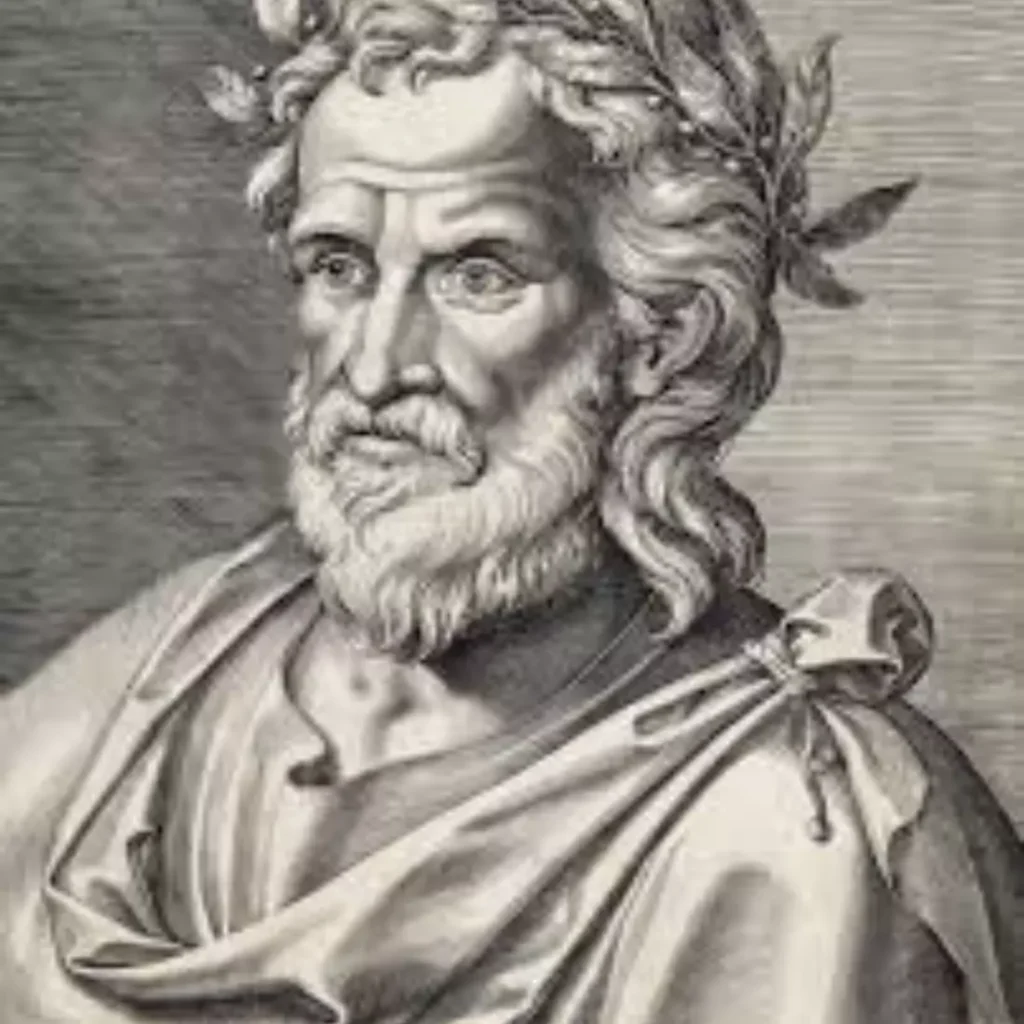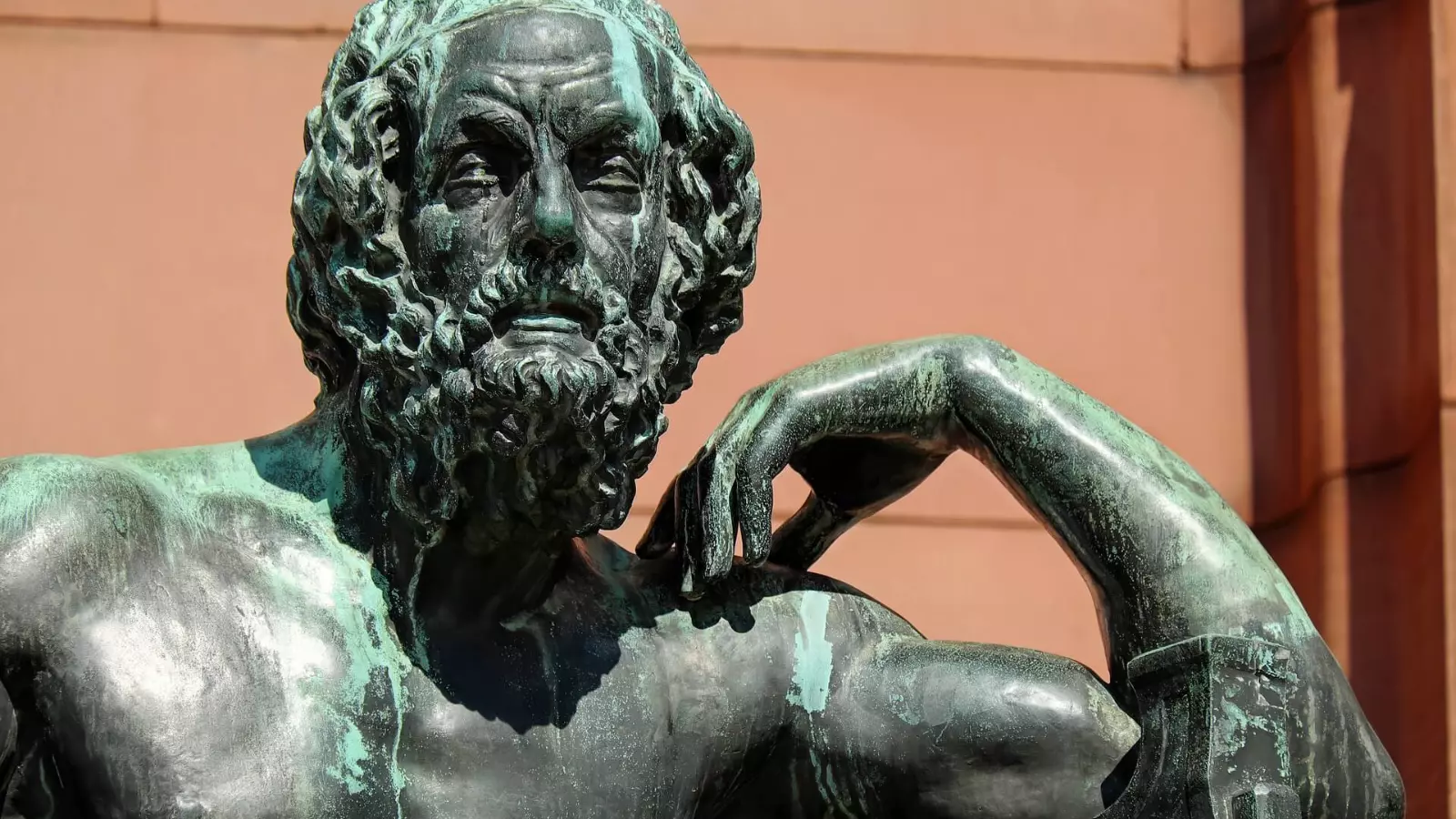Short About
Homer was an ancient Greek poet credited with composing the epic poems “The Iliad” and “The Odyssey,” which have profoundly shaped Western literature and culture.
Did you know?
Homer’s works were originally composed and transmitted orally for centuries before being written down. This oral tradition is reflected in the use of repetitive phrases and epithets throughout the epics.
Net Worth
As an ancient figure, Homer’s net worth is not applicable. However, the cultural and literary value of his works is inestimable.
| Attribute | Information |
| Profession | Poet |
| Age | Unknown (Lived around 8th or 7th century BCE) |
| Birthday | Unknown |
| Height (cm) | Unknown |
| Birthplace | Disputed (possibly Ionia) |
| Net Worth | Not applicable |
| School | Unknown |
Biography
Early Life and Origins
The exact details of Homer’s birth and early life are uncertain. Scholars debate whether Homer was a single individual or a collective name for multiple poets. Tradition places his birth in Ionia, a region on the western coast of modern-day Turkey.
Career and Works
Homer’s two major epics, “The Iliad” and “The Odyssey,” are cornerstones of Western literature. These works, composed in dactylic hexameter, tell the stories of the Trojan War and Odysseus’s journey home, respectively.
Legacy
Homer’s influence on literature, art, and culture is immeasurable. His works have inspired countless adaptations, translations, and reinterpretations across various media.
Recent Developments and Popular Searches
Digital Humanities and Homer
Recent years have seen a surge in digital humanities projects focused on Homeric texts. These initiatives use advanced computational methods to analyze linguistic patterns, narrative structures, and cultural references in Homer’s works.
Archaeology and Homeric Studies
New archaeological discoveries continue to shed light on the historical context of Homer’s epics. Excavations in Turkey and Greece have uncovered sites that may correspond to locations mentioned in “The Iliad” and “The Odyssey.”
Contemporary Adaptations
Homer’s works remain popular subjects for modern adaptations. Recent years have seen acclaimed retellings of Homeric epics, such as Madeline Miller’s “Circe” and Pat Barker’s “The Silence of the Girls.”
As Homer lived in ancient times, he does not have social media accounts. However, his enduring popularity is evident in the numerous online communities and academic forums dedicated to discussing his works.
Additional Factors
Demographics
- Target Audience: Students, scholars, literature enthusiasts, and general readers interested in classical literature and ancient Greek culture.
Interests and Lifestyle
- Related Interests: Ancient history, mythology, epic poetry, classical literature, archaeology, and linguistics.
Psychographics
- Values: Appreciation for cultural heritage, intellectual curiosity, and the enduring power of storytelling.
Homer Biography

While precise biographical details are scarce, Homer is believed to have lived between the 8th and 7th centuries BCE. Various ancient sources claim different birthplaces for Homer, including Smyrna, Chios, and Colophon.
Works
Homer’s main works are “The Iliad” and “The Odyssey.” Some ancient sources also attribute other works to Homer, such as the “Homeric Hymns,” though their authorship is disputed.
Authorship
The “Homeric Question” refers to the ongoing debate about the identity of Homer and the authorship of the epics attributed to him. Some scholars argue for single authorship, while others propose multiple authors or an evolving oral tradition.
Influence
Homer’s influence extends far beyond literature, impacting art, philosophy, and cultural identity throughout history. His works have been foundational texts in Western education for centuries.
Themes and Analysis
Key themes in Homer’s works include heroism, fate, honor, and the human condition. His epics explore complex moral questions and the relationships between mortals and gods.
Homeric Question
The Homeric Question encompasses debates about Homer’s identity, the historical accuracy of his epics, and the composition process of “The Iliad” and “The Odyssey.”
Translations
Numerous translations of Homer’s works exist, ranging from literal renderings to poetic interpretations. Notable translators include George Chapman, Alexander Pope, and Emily Wilson.
Historical Context
Homer’s epics are set against the backdrop of the Late Bronze Age in Greece, reflecting societal structures, cultural practices, and mythological beliefs of that era.
Legacy
Homer’s legacy is evident in countless literary works, from Virgil’s “Aeneid” to James Joyce’s “Ulysses.” His influence extends to modern media, including film, television, and video games.
Quotations
Some famous quotes attributed to Homer include:
- “Be both a speaker of words and a doer of deeds.“
- “Even a fool may be wise after the event.“
- “There is a time for many words, and there is also a time for sleep.“

Justin Taylor is a passionate writer and expert in personality profiling. With a keen eye for detail and a love for uncovering what makes people unique, Justin’s insights are both engaging and enlightening. Outside of writing, he enjoys traveling, reading, and stimulating conversations.










